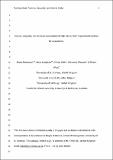Files in this item
Poverty, inequality, and increased consumption of high calorie food : experimental evidence for a causal link
Item metadata
| dc.contributor.author | Bratanova, Boyka | |
| dc.contributor.author | Loughnan, Steve | |
| dc.contributor.author | Klein, Olivier | |
| dc.contributor.author | Claassen, Almudena | |
| dc.contributor.author | Wood, Robert | |
| dc.date.accessioned | 2017-01-23T00:32:23Z | |
| dc.date.available | 2017-01-23T00:32:23Z | |
| dc.date.issued | 2016-05-01 | |
| dc.identifier | 240524095 | |
| dc.identifier | b93b872c-ea32-41ec-9a55-a56557512105 | |
| dc.identifier | 84958950867 | |
| dc.identifier | 000373866200019 | |
| dc.identifier.citation | Bratanova , B , Loughnan , S , Klein , O , Claassen , A & Wood , R 2016 , ' Poverty, inequality, and increased consumption of high calorie food : experimental evidence for a causal link ' , Appetite , vol. 100 , pp. 162–171 . https://doi.org/10.1016/j.appet.2016.01.028 | en |
| dc.identifier.issn | 0195-6663 | |
| dc.identifier.other | ORCID: /0000-0001-8247-0871/work/64361376 | |
| dc.identifier.uri | https://hdl.handle.net/10023/10149 | |
| dc.description | This research was supported by a grant of the Walloon Region awarded to a team of Université Libre de Bruxelles researchers, including the third and the forth authors (Belgium, FOOD4GUT, project # 1318148), and a fellowship from the Bureau des Relations Internationales (BRIC) of the Université Libre de Bruxelles awarded to the first author. | en |
| dc.description.abstract | Rising obesity represents a serious, global problem. It is now well established that obesity is associated with poverty and wealth inequality, suggesting that these factors may promote caloric intake. Whereas previous work has examined these links from an epidemiological perspective, the current paper examined them experimentally. In Study 1 we found that people experimentally induced to view themselves as poor (v. wealthy) exhibited increased calorie intake. In Study 2, participants who believed that they were poorer or wealthier than their interaction partners exhibited higher levels of anxiety compared to those in an equal partners condition; this anxiety in turn led to increased calorie consumption for people who had a strong need to belong. The findings provide causal evidence for the poverty-intake and inequality-intake links. Further, we identify social anxiety and a strong need to belong as important social psychological factors linking inequality to increased calorie intake. | |
| dc.format.extent | 753517 | |
| dc.language.iso | eng | |
| dc.relation.ispartof | Appetite | en |
| dc.subject | Food | en |
| dc.subject | Anxiety | en |
| dc.subject | Inequality | en |
| dc.subject | Poverty | en |
| dc.subject | Obesity | en |
| dc.subject | HC Economic History and Conditions | en |
| dc.subject | BDC | en |
| dc.subject | R2C | en |
| dc.subject | SDG 3 - Good Health and Well-being | en |
| dc.subject | SDG 10 - Reduced Inequalities | en |
| dc.subject.lcc | HC | en |
| dc.title | Poverty, inequality, and increased consumption of high calorie food : experimental evidence for a causal link | en |
| dc.type | Journal article | en |
| dc.contributor.institution | University of St Andrews. Centre for Research into Equality, Diversity & Inclusion | en |
| dc.contributor.institution | University of St Andrews. School of Management | en |
| dc.identifier.doi | 10.1016/j.appet.2016.01.028 | |
| dc.description.status | Peer reviewed | en |
| dc.date.embargoedUntil | 2017-01-22 |
This item appears in the following Collection(s)
Items in the St Andrews Research Repository are protected by copyright, with all rights reserved, unless otherwise indicated.

